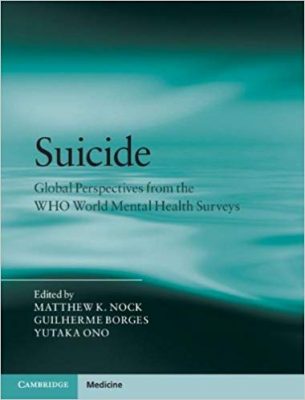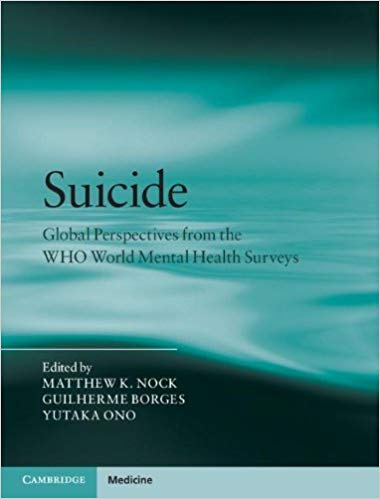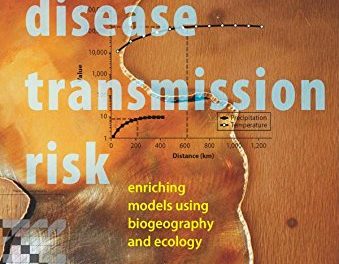 Editors: Matthew K. Nock, Guilherme Borges, and Yutaka Ono
Editors: Matthew K. Nock, Guilherme Borges, and Yutaka Ono
Publisher: Cambridge University Press – 391 pages
Book Review by: Nano Khilnani
Russia ranks No.1 in the world in suicides among males, and No. 31 among females, according a January 2018 report of data compiled by the World Health Organization. There were 48.3 among every 100,000 males and 7.5 among every 100,000 females who committed suicide in Russia.
The combined ‘both sexes’ number for Russians was nearly 56 (55.8) but that country ranked No.3 with Guyana and Lesotho topping Russia in the combined ranking of males and females together. Our source for this WHO data is a Wikipedia article online.
This book on suicides also derived its data from the World Health Organization, but we could not verify if that data was from the same WHO survey we found online on Wikipedia.
Fifty specialists in suicidal behavior and its causes, from all over the United States and 22 other countries – Australia, Austria, Belgium, Brazil, Bulgaria, China, Colombia, France, Germany, India, Israel, Italy, Japan, Lebanon, Mexico, the Netherlands, New Zealand, Nigeria, Romania, South Africa, Spain, and Switzerland – authored the 16 chapters of this book.
We have listed the titles of the chapters below for you to take a quick glance first at what types of behavior lead to suicide. You can pick any chapter to read first, as there is no requirement for you to read certain chapters initially to gain some background information in understanding some topics before reading about others.
- Section I – Introduction
- Global Perspectives on suicidal behavior
- The epidemiology of suicide and suicidal behavior
- Methods of the World Mental Health Surveys
- Section II – Prevalence and course of suicidal behavior
- Prevalence, onset, and transitions among suicidal behaviors
- Persistence of suicidal behaviors over time
- Section III – Lifetime risk factors to suicidal behavior
- Sociodemographic risk factors for suicidal behavior: results from the WHO World Mental Health Surveys
- Parental psychopathology and the risk of suicidal behavior
- Childhood adversities as risk factors for onset and persistence of suicidal behavior
- Traumatic events and suicidal behavior
- Mental disorders, comorbidity, and suicidal behavior
- Chronic physical conditions and the onset of suicidal behavior
- Integrative models of suicidal behavior
- Section IV – Twelve-month risk factors and treatment
- Prevalence and identification of groups at risk for twelve-month suicidal behavior in the WHO World Mental Health Surveys
- Treatment of suicidal persons around the world
- Section V – Conclusions and future directions
- Research, clinical, and policy implications of the World Mental Health Survey findings on suicidal behavior
- Conclusions and future directions
The editors point out on the back cover of this book that suicides account for more loss of life annually than all forms of war and interpersonal violence combined.
So suicide is a large problem, but progress towards fully and deeply understanding why people take their own lives has been slow in coming
Suicide remains a perplexing problem, and the knowledge shared in this work, if read by enough specialists is applied in treating their patients, a difference can be made in the form of a few lives saved. If the workable solutions (treatments) are spread very far and wide, a significant change can be achieved. We are doing our part by featuring this book in a review in the Books Section of BIZ INDIA Online News.
The editors and authors of the chapters have made a valuable contribution to the public by understanding the various causes of suicides, and informing the public of their findings, insight and knowledge imparted through this book.
Editors:
Matthew K. Nock is a Professor in the Department of Psychology at Harvard University in Cambridge, Massachusetts.
Guilherme Borges is a Senior Researcher and Professor of Epidemiology at the national Institute of Psychiatry and Universidad Autonoma Metropolitana in Mexico City, Mexico.
Yutaka Ono is a Professor in the Stress Management Center at Keio University School of Medicine in Shinjuku-ku in Tokyo, Japan.







